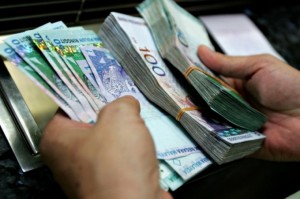When journalists receive cash from politicians

The first time a politician tried to bribe me was during the Teluk Intan by-election in May.
Boo Su-Lyn, MMO
After interviewing him, he pressed a brown envelope into my hand without saying anything.
I didn’t think about it much because I was in a rush and opened the envelope only later on. There was a crisp RM100 bill in it.
I was shocked. I’d never encountered this before in my three years in journalism.
Then I got offended.
I had planned on covering one of the country’s most heated by-elections impartially. How could I do that if I accepted payment for a news story? I immediately reported the incident to my editors.
It didn’t stop there.
The same thing happened recently at another politician’s buka puasa function.
After the press conference, the press secretary gave out colourful packets to the media as we left the room. He said nothing as he handed them out. I thought it was just a card and put it in my bag without a second thought.
When I opened it after reaching home, I found two RM50 notes inside.
Apparently, it’s quite common for the media to receive cash at open houses during the festive season.
My company — The Malay Mail Online — prohibits staff from accepting payments or expensive gifts worth more than RM100 from news sources, corporations or news makers.
Various international news organisations have similar policies.
Reuters prohibits accepting or offering payment for a news story and views such action as a “grave breach” of ethics that can lead to disciplinary action like dismissal.
The New York Times also does not allow their staff to accept anything that can be perceived as a payment for favourable coverage, or as an inducement to skip or change unfavourable coverage.
What about gifts then? It’s usual for pressmen to receive door gifts at various media functions.
Most of the time, they are just cheap items like mugs, notebooks or plastic pens. But sometimes, we get thumb drives and power banks too. Gifts offered at lucky draws on media appreciation nights include tabs, iPads and cameras.
UK paper the Guardian has a policy of returning gifts that are valued more than £25 (RM135) or giving them to charity. The Times and Associated Press similarly prohibit staff from accepting gifts worth more than US$25 (RM79).
Last year, Media Prima announced a “no festive gifts” policy prohibiting employees from receiving gifts for the sake maintaining impartiality.
According to the columnist, it’s quite common for the media to receive cash at open houses during the festive season. — AFP pic
I called the Malaysian Anti-Corruption Commission (MACC) to find out if the politicians giving me cash was considered corruption.
Although the authorities said the politicians should not have done that, they said it would be difficult to prove corruption since the politicians did not say anything when handing me the cash.
I’ve since given the money to a women’s rights NGO and sent the receipts to both politicians.
Lastly, accepting hospitality may be the greyest area in this issue, especially in a country like Malaysia where food is deeply ingrained in our culture.
I usually insist on picking up the tab when going out with a news source, but meals served at media events are a little trickier.
Food is provided at almost every media function I attend, whether it’s something as simple as noodles and coffee for breakfast, or a full-fledged buffet lunch at a five-star hotel.
We can get so accustomed to it that we become “entitled” journalists.
Read more at: http://www.themalaymailonline.com/opinion/boo-su-lyn/article/when-journalists-receive-cash-from-politicians

